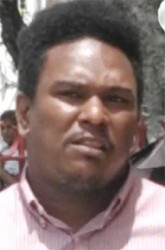Samuel Hinds Jr has moved to the High Court through his attorneys Peter Hugh and Latchmie Rahamat in a bid to stay Magistrate’s Court proceedings against him.
Hinds Jr, son of former prime minister Samuel Hinds, was found guilty by Magistrate Geeta Chandan-Edmond of beating his sister-in-law Tenza Lane and threatening her with a gun at his Duke Street, Kingston home last year.
After conviction, his sentencing was set for February 20 this year pending the presentation of a probation report. How-ever this has since been delayed for numerous reasons, including the removal of the magistrate.

Magistrate Annette Singh, to whom the case was subsequently assigned, is still to receive direction, which she has requested from the High Court, regarding how to proceed on the conviction. The matter is scheduled to be heard before her this morning at 11.
At a June 12 hearing, Magistrate Singh had said that if the application to the High Court for guidance was not processed by today, she would make a decision in the matter.
Hugh stressed that his client wants the matter to come to an end and should not have to face a retrial.
In his notice of motion filed on July 2 before the High Court, Hinds is seeking relief on a number of grounds including that the Supreme Court stays any further prosecution and/or adjudication by the court of criminal charges against him.
Hinds advances in his motion that the undue and unreasonable delay by the state to complete his matters, through no fault of his, has operated to the detriment of his defence since certain of his witnesses are no longer available and/or willing and cannot be found.
He argues that to defend the charges against him in those circumstances would be “unfair, unreasonable, and in breach of the principles of fair hearing and an abuse of process.”
Another ground in his motion states that the evidence led before Magis-trate Chandan-Edmond does not support the commission of any offence and that her decision was arbitrary, null, void and breached his fundamental rights under article 144 of the constitution.

He further contends that if Magistrate Singh has to determine the charges against him and if she also proceeds to sentence him, then his fundamental right to a fair hearing within a reasonable time is likely to be further infringed.
The Attorney General is listed as the respondent in the court documents.
There has been division over whether Magistrate Singh, who was subsequently assigned the case, can proceed with sentencing.
The Chambers of the Director of Public Prosecutions (DPP) has advised that Hinds Jr be retried, while saying the law does not allow for him to be sentenced by a magistrate who did not conduct the trial that led to his conviction. In a statement, the DPP’s Chambers said the decision to recommend a retrial was based on Section 35 of the Summary Jurisdiction (Procedure) Act. “This section clearly states that the magistrate who hears the matter shall give the decision. This means that one magistrate cannot hear the matter and another give the decision. Decision has been interpreted by the Courts in judicial precedents to mean a final adjudication, which includes a verdict and a sentence,” the statement said.
Lawyers for Hinds Jr have argued that a retrial would violate the constitution, which stipulates that a person should not be tried twice for the same offence, having already been tried and convicted.
Article 144 (5) of the Constitution states: “No person who shows that he has been tried by a competent court for a criminal offence and either convicted or acquitted shall again be tried for that offence or for any other criminal offence of which he could have been convicted at the trial for that offence, save upon the order of a superior court in the course of appeal proceedings relating to the conviction or acquittal.”
His lawyers have stated that the constitution is the supreme law of the land, as opposed to other laws.
The trial into the charge against Hinds Jr ended on May 23 last year, when he gave sworn testimony from the witness box after being called to lead a defence as the court had ruled that a prima facie case had been made out against him.
July 4, 2014 was then subsequently set for ruling, but Hinds was repeatedly absent from court, for one reason or another. His attorneys would either report that he was out of the jurisdiction or ill.
After July 4, the case had been adjourned for ruling on July 18, August 15, October 13, November 14, December 5 and December 30. The accused was absent on all of those dates and it was reported by counsel that he was out of the jurisdiction.
On December 30 last, Rahamat was granted a January 21 adjournment at which hearing her client was again absent.
After apologizing for the man’s absence, she was then granted February 6 for ruling; the ninth adjournment at that point.
According to her Hinds was unwell and was not aware that he needed to provide a medical to the court for his absence.
He was again a no-show on February 6 at which point February 20 was set for sentencing.
Chandan-Edmond was subsequently discharged from duty due to absenteeism, but a statement from her attorney Nigel Hughes implied a link between her dismissal and her presiding over Hinds’ trial.
It is the police’s case that Hinds Jnr had called Lane a thief, threw her to the ground, stomped her in the face and dragged her by her hair around his house. The man had denied the charge.
Lane was also charged with assaulting Hinds, but was cleared after a trial.





